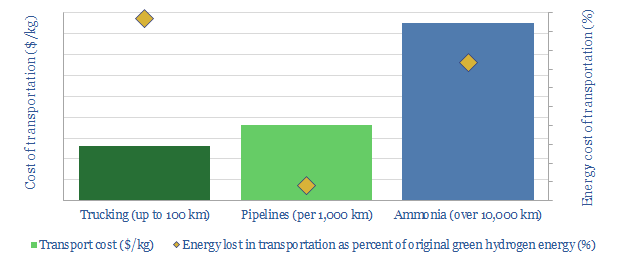Transporting hydrogen will be more challenging than for any other commodity ever commercialised in the history of global energy. This 19-page note reviews the costs and complexities of cryogenic trucks, hydrogen pipelines and chemical hydrogen carriers (e.g., ammonia). Midstream costs will be 2-10x higher than comparable gas value chains, while up to 50% of hydrogen’s embedded energy may be lost in transportation.
We have assessed the costs of green hydrogen value chains in our prior research, focusing on power and trucking. The costs are re-capped on pages 2-3. But our calculations assume all hydrogen is generated near its point of sale. This note assesses the additional costs and complexities of hydrogen transport.
Hydrogen is inherently more complex to transport than natural gas, due to immutable physical and chemical differences, which are spelled out on pages 4-5.
Cryogenic trucks are assessed on pages 6-7. Liquefying hydrogen at -253C and the associated boil-off may consume c50% as much energy as is in the delivered hydrogen.
New hydrogen pipelines are assessed on pages 8-12, including a deep-dive into the fluid mechanics. Costs will inherently be 2-10x higher than for natural gas.
Blending hydrogen into pre-existing gas pipelines is assessed on pages 13-14. This option introduces unfathomable complexity for a mere 3-6% CO2 reduction.
Chemical carriers such as ammonia are assessed on pages 15-17. We model the value chain end-to-end, which makes for interesting conclusions on Air Products’s recently sanctioned $7bn hydrogen-ammonia project in Saudi Arabia.
The impact on hydrogen costs is quantified on pages 18-19. We conclude hydrogen transport would increase our power and trucking costs by c10-25%.
